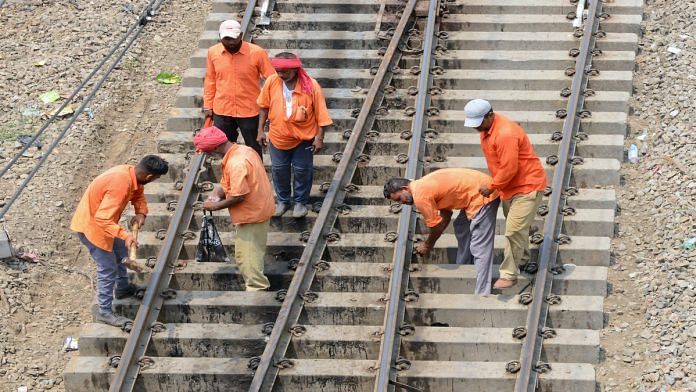
According to Railway Recruitment Board sources, a majority of the 1.9 crore applicants for Level 1 jobs are overqualified.
New Delhi: On 17 September, 1.9 crore applicants will appear for the Railway Recruitment Board (RRB) examination to fill 62,907 vacancies at ‘Level 1’, earlier called ‘Group D’.
That is, 302 applicants for every job — jobs that are at the lowest level in the railways, including posts such as gangman (those who maintain tracks), gateman, pointsman, helper in electrical/mechanical/engineering/ signal/telecommunications, porter etc.
The minimum qualification for these is class 10, or certificates from the National Council on Vocational Training or Industrial Training Institutes, or National Apprenticeship Certificates.
Also read: Restless, young India has no connection to IITs & IIMs, but Rahul Gandhi can’t see it
But this time, a majority of applicants for these jobs are graduates, post-graduates and even engineers, according to RRB sources.
This is not a one-off. The RRB had also held an exam for 1.27 lakh posts on 31 August. About 2.35 crore people applied, and a vast number of them too were overqualified.
Government officials and independent analysts said this is a clear indication of India’s employment crisis — the sheer lack of jobs for qualified people. A crisis that was high on the agenda of Prime Minister Narendra Modi before the 2014 elections.
Modi had promised the creation of 2 crore jobs a year. However, there seems to be no clarity on the actual number of jobs created since he took over in 2014.
Also read: Missing data on jobs may play key role in 2019 elections
While the government said 31.1 lakh jobs were added between September 2017 and February 2018, researchers like the Centre for Monitoring Indian Economy (CMIE) said the figure was closer to 18 lakh.
‘Heading towards disaster’
Economists term this trend as ‘forced employment’, because there are no jobs available for certain qualifications.
Economist Prasenjit Bose said there has been no generation of jobs.
“While the private/corporate sector has not been in the pink of health for many years, the proportion of government jobs is also shrinking. There is no expansion of jobs offering proper employment contract, proper pay and social security,” he told ThePrint.
“The government has claimed to have delivered high growth, but the growth has slowed down. With demonetisation, the commerce sector has been squeezed and has received a huge blow,” said Bose.
Also read: India, world’s fastest growing economy, isn’t growing fast enough to create enough jobs
“In terms of jobs, we are heading towards disaster. There is no proper data available in terms of employment and unemployment, because our employment cell is in a mess.”
Bose also pointed to the figures released by the CMIE this year — that 31 million Indians are still looking for jobs. He said if the government does not change its policy, or if the economy isn’t expanded soon, no jobs will be created.
A secure job
Kamal Karanth, co-founder of Xpheno, a specialist staffing firm, said one of the reasons why overqualified people were applying for gangman jobs was the simple fact that the railways, like other government posts, provided ‘job security’.
“Going by the current scenario, many graduates and post-graduates or even engineers are not fully settled in what they are doing. These candidates are on the lookout for jobs offering security and additional benefits, especially if medical exigencies are taken care of. This is the workplace dynamic these days,” he said.
RRB executive director Amitabha Khare agreed that the reason so many overqualified people were applying for ‘Level 1’ posts was “a secure job”.
No dearth of jobs
However, not everyone agrees. Soumya Kanti Ghosh, chief economic adviser to the State Bank of India, has produced a report highlighting that there is no dearth of jobs.
Also read: Railways lost out due to neglect, warped policies – Suresh Prabhu
As per the report, out of the 1.5 crore people that are added to the labour force every year, 66 lakh are ‘qualified manpower’. In financial year 2016-17, 45 lakh new people were added to payrolls across 190 industries, while in FY 2017-18, the number went up to 55 lakh.
“The data indicates that an average of 50,000 people are joining every month in state government and central government,” said Ghosh.

SIRHELPHELPHELPHELPPRIMEMINISTERNARENDRAMODISIR15JULY2015LAUNCHEDNATIONALSKILLDEVELOPMENTJOBJOININGLETTERHELP UBICHERALAVILLEGE Cell9652393957
Majority of Over qualified are poorly performing students who passed out from third rate state or private colleges who appears for all the govt job exams
For the first time in living memory, there has been loss of employment.